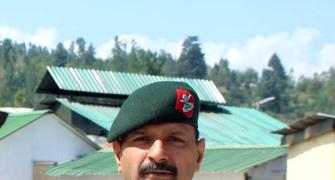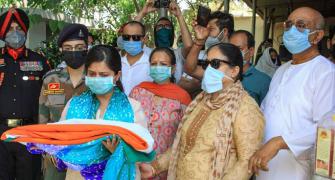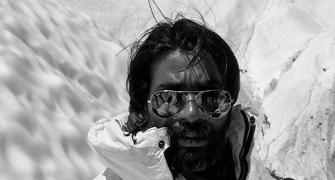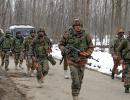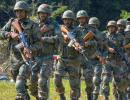'Yet, in J&K even if you are not involved in active combat, you can come under enemy fire.'
'However young a soldier is, he is not immune to action.'
'He may face challenges during the course of discharging his military duties.'
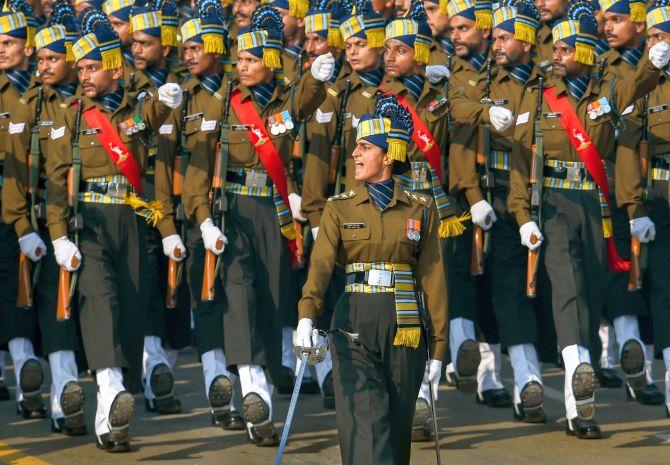
In what is being hailed as a bold move, the Indian Army plans to permit civilian youth and professionals to join the organisation for a tenure of three years.
100 officers and 1,000 jawans will be initially inducted.
Captain Neil Shaji -- reportedly to be the youngest to be awarded a Vishisht Seva Medal -- is a Territorial Army Officer who straddles both the civilian and military worlds.
As part of the Territorial Army, it is mandatory for him to serve a minimum of two months every year in the army. His employment as a strategy consultant remains his primary job.
Captain Shaji joined the Territorial Army in 2015 and has also served with the Special Forces. He is a rare Territorial Army officer to be awarded the Vishisht Seva Medal for distinguished service in the armed forces.
"When you put yourself through military training, you compete with yourself, test yourself, challenge yourself, be a team player and overall become a better citizen," Captain Shaji tells Archana Masih/Rediff.com.
How will the induction of civilians into the Indian Army for three years influence the youth of the country?
It will inculcate leadership skills and create a disciplined youth force.
In any area of life -- personal or professional -- it is very difficult to move ahead without discipline and the ability to handle challenging situations. That is what army training teaches you as a soldier and officer.
It will not be compulsory like conscription in Israel, but voluntary.
It is a bold and welcome move and should be tried out. It will have a long implication as far as benefitting the country is concerned.
The world may see this as increasing your military strength which other countries and adversaries may find difficult to digest, but we are not a war-mongering nation.
At the end of the day, we are creating a youth force which can be called upon when there is a need -- and of course, create a youth full of motivation, energy and discipline to eventually benefit civil society.
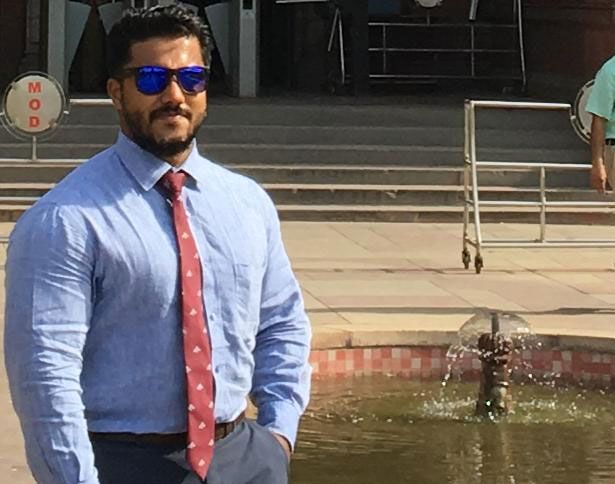
How different will this be from the Territorial Army which gives an opportunity to people pursuing civilian careers to give a minimum of two months military service every year?
In this route a youngster will be serving the army continuously for three years.
S/he will be involved in military training and discharging national duties just like any other member of the armed forces.
Those who join the Territorial Army are also involved in a civil profession.
For example, I lead a strategy consulting firm advising various multinational companies.
As a Territorial Army officer, I have the versatility to work with the army for two months and concentrate on my civil employment for the rest of the time.
Though we have the option to serve for a longer time too, a minimum of two months is the mandatory requirement.
The Territorial Army is not a permanent job. The Territorial Army is an option for a civilian to don the uniform after training.
Territorial Army officers retire as any other officer of the armed forces according to their rank, but in this proposed tour of duty, those who are inducted will complete their tenure after three years.
As a civilian who has undergone training to serve the Indian Army, what do you think the selection process should be for this bunch of youngsters?
The present selection is based on a candidate clearing the UPSC exam and Service Selection Board interview.
In the SSB interview, the candidate is tested for 15 officer-like qualities to gauge the leadership and other dynamic qualities of a candidate in the role of a defence officer operating in the battlefield and in times of crisis.
There is no discussion at this point about selection methodology -- SSB or no SSB.
It is important to have these 15 qualities to be an officer, but if the engagement is only for three years, maybe there will be a relaxation on those strict criteria.
Motivation and physical traits will be an important factor if we are looking to employ a larger group of people.
How is this likely to affect the current makeup of the army? How will officers adjust to this new lot of youngsters who have not undergone the same rigours of military training?
I am sure the army leadership has thought well of this. The armed forces as an organisation can be conservative, but the army is also an organisation which knows how to effectively use its manpower.
My assumption is that this youth will be utilised for roles that suit their maturity and experience. I don't think a youth with six months of service will be thrown into hard core anti-terrorist operations.
The aim is to create a force level which can be mobilised, if need be in any situation. But for that they need to have the basic knowledge of how to fire a weapon, tactics and basic drill.
The first three years for officers are the budding years when they learn to conduct operations.
Those 5-6 initial years is when they learn aspects of training, motivating their men, basics of ground combat and how to deal with emergencies.
Definitely there will be a lot of youngsters bubbling with energy to be a part of military activities.
When you have youth full of energy that vibe passes down to all the soldiers.
Army leadership is all about morale and motivation.
The army will know how to employ them, they will give them some exposure, but it will be a tamed exposure suiting their training and capability.
I don't think they will be involved in active combat.
Yet, in J&K even if you are not involved in active combat, you can come under enemy fire.
However young a soldier is, he is not immune to action. He may face challenges during the course of discharging his military duties.
There is a shortage of roughly 30,000 officers in the army. These youth might fill in those gaps in some aspects.
The idea is also to induct jawans for three years, how will that help?
The bulk of army jawans come from the rural community and are not graduates. They might get a Rs 10,000 to Rs 15,000 job outside, but here it increases the employment option with a better salary.
It will provide huge employment, and after three years they will have acquired skill sets which will help them perform better in the civil world. Apart from qualities of physical courage and confidence.
How will this impact the overall health of the Republic? Will the youth be better equipped when they re-enter civil life after three years?
It will have imbibed in them military discipline, physical fitness, training and all over physical and mental health.
The more important thing I would say is that when you put yourself through military training, you compete with yourself, test yourself, challenge yourself and overall become a citizen who is a team player.
They will come out becoming better citizens.
Personally, my training in the Special Forces has taught me that you are more than what you think you are. There is no limit to what can you do.

